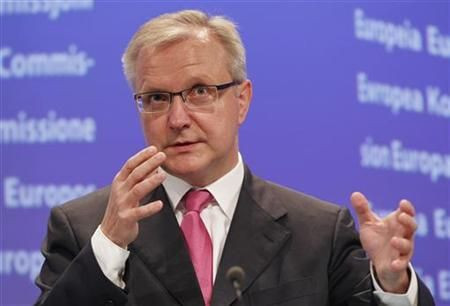EU's Rehn calls for collective action as ‘common bond’ faces headwinds

A day after Germany rejected the proposal to establish a common market for eurozone sovereign bonds, EU Economics and Monetary Affairs Commissioner Olli Rehn called for coordinated action to repair the damage of the debt crisis afflicting the region.
We have to take well coordinated action to safeguard stability in the euro area, Rehn said, adding that the current situation is far more than a crisis of the euro and that Greece is not the only country facing major challenges.
Eurogroup chairman Jean-Claude Juncker said on Wednesday Berlin rejected common euro zone bond proposal without studying it in detail.
Calls for the creation of a market for eurozone government bonds heightened following sequential bailouts of Greece and Portugal and the likelihood of a similar package for Portugal in future. Juncker and Italian Finance Minister Giulio Tremonti spearheaded the proposal saying a common eurozone bond will calm the market's fears about the worsening debt crisis and shore up trust in the future of euro common currency.
However, Germany has strongly opposed the proposal on economic grounds, with Chancellor Angela Merkel making it clear that she would not commit to a plan under which German taxpayer money will be used for guaranteeing the debt of all other eurozone governments.
IMF head Dominique Strauss-Kahn criticized EU countries on Wednesday, saying their response was marked by slowness and asked Brussels to work for comprehensive solution to the crisis.
My view is very simple—the euro zone must find a comprehensive solution to this problem, Strauss-Kahn was quoted by Wall Street Journal. It is not a good approach that for every country we find a separate solution.
Rehn said on Thursday the eurozone was gearing up for comprehensive reform and would set up a new system for economic governance. We will not stop until we have accomplished our mission. We are now in the decade of fundamental reforms, he said.
Earlier, IMF's Strauss-Kahn pointed to institutional drawbacks, saying they were not created to deal with crisis. The institutional organs of the European system likely need some improvement so as to react more quickly, he said. They were not created to deal with crisis, they were created for more peaceful times.
Strauss-Kahn said though the problem of high debt in some eurozone countries is a serious one he did not think it was serious enough to bring down the common currency union. But he said the problem could be addressed in a complete and comprehensive manner.
However, the creation of a common bond market, if at all it happens, will not solve all of eurozone's financial troubles, analysts have pointed out. We are skeptical, however, that the idea will get off the ground. And even it does, it won’t solve all the euro-zone’s problems, Capital Economics analyst John Higgins wrote in a note.
He said such a proposal will have nothing in it to improve the inherent weakness of the debt-hit countries and increase their competitiveness. In particular, many countries would still have to undertake draconian fiscal tightening over many years, and indeed the pressure on them to get their public finances in order could be even greater if other governments were guaranteeing their debt.
© Copyright IBTimes 2025. All rights reserved.





















